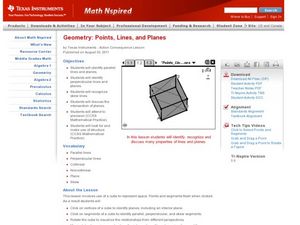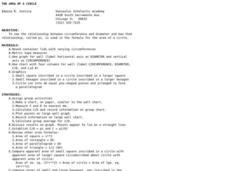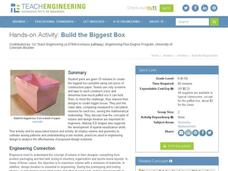Curated OER
Worksheet 34 - Fall 1995
In this math worksheet, students sketch the finite area whose boundary is composed of pieces of the curves x =1− y 4 and x = y2 − 1.
Curated OER
Have You Got the Angle?: Pre Test
In this angles worksheet, students complete multiple choice questions about the shape and number of angles. Students complete 10 questions total.
Curated OER
Troublesome Towers
Learners observe solids and identify parts that make up the surface area. In this geometry instructional activity, students calculate the surface are of solids and cones. They find polygons and solids in the real world.
Curated OER
Geometry Journal: Classifying Solids
In this geometry worksheet, 10th graders respond to journal prompts related to prisms and classifying solid shapes. The two page worksheet contains nine questions. Answers are included.
Curated OER
Big Bellies and Dandy Duffs
Learners practice tracing and identifying lower-case b and d letters as well as pictures containing examples of those letters. They mimic the sounds that the letters make and offer examples of those sounds rhyming when applicable.
Curated OER
Using Concept Maps to Design 3D Spheres
Students create three dimensional shapes using concept maps. In this geometry lesson, students investigate the impact of mental schemas on humans. They collect data on this topic and plot their data on a coordinate plane.
Curated OER
Tessellmaniacs
Seventh graders create 3 original tessellation using polygons. They slide, turn, rotate and glide their designs on the computer. They print their tessellation on a T-shirt and teach the 6th graders about tessellations.
Curated OER
Tantalizing Tessellations Lesson III: Creating a Slide Translation
Students explore tessellations and the artwork of M.C. Escher. They view and discuss a video about M.C. Escher, create a slide template out of cardboard, and create a poster with their tessellation pattern.
Curated OER
Spies That Fly
High schoolers view a video clip about spy planes. They identify the challenges engineers face in building small aircraft. They complete a worksheet to end the lesson.
Curated OER
Measuring Angles & Segments
Students view a PowerPoint for a warm-up lesson. They practice measuring around the classroom, measuring such things as the length and width of a desk, pencil, door, and book. Students use a website to practice measuring angles.
Texas Instruments
Points, Lines, and Planes
Students solve problems dealing with points, lines and planes. In this geometry lesson, students differentiate between parallel lines and planes. They find the intersection of lines and planes.
Curated OER
Napolean Triangle
Learners investigate the Napoleon triangle theory. In this polygon lesson plan, students differentiate between the boundary points, interior and lattice point of a polygon. They apply concepts of equilateral triangles to solve...
Curated OER
THE AREA OF A CIRCLE
Students examine the relationship between circumference and diameter and how to use the formula to find the area of a circle. In this circle lesson students divide into groups and complete an activity.
Curated OER
Mimicking Nature; Science, Aviation, Flight, Wings
Students consider the relationship between form and flight and investigate the history of man made flight and how wing shape and flexibility affects the maneuverability of an aircraft.
Curated OER
Cut, Construct and Think - 6
Students identify polygons and calculate perimeter. For this geometric shapes lesson, students complete a worksheet identifying various polygons and calculating the perimeter of triangles and quadrilaterals.
Curated OER
Artistic Angles
Fifth graders explore angles by using protractors. They recognize, describe and determine the surface area and volume of three-dimensional shapes. Students recognize the right angle, acute angle, obtuse angle and vertex. They identify...
Curated OER
Using 3-D Models for Code Validation with FoilSim
Learners use FoilSim to complete the activity to create tables of data sets comparing the lift values for a 3-D model of a symmetrical wing section to the values predicted by the FoilSim software.
Curated OER
Classify Prisms
Middle schoolers classify prisms according to their attributes. In this classifying prisms lesson, students explore different prisms. Middle schoolers generate observations of the attributes and classify the prism correctly.
Curated OER
Using Polynomials To Find Perimeter
Fifth graders engage in the solving of a real life application problem using the concept of calculating perimeter. They apply the operations of calculating with the polynomials for finding the perimeter of triangles,quadrilaterals, and...
Curated OER
How is our place connected to other places?
Second graders conduct a survey, they record their data with the help of maps. They use an aerial photo or Ordnance Survey map, 2nd graders pinpoint specific places and add them to a legend using the drawing tools. Students use...
Teach Engineering
Build the Biggest Box
Boxing takes on a whole new meaning! The second installment of the three-part series has groups create lidless boxes from construction paper that can hold the most rice. After testing out their constructions, they build a new box....
Curated OER
Around the Bend
Young scholars examine the art elements of the Inca "Large Jug." In this visual art lesson, students identify the colors, pattern, and shape of the Inca "Large Jug." Young scholars then draw a design on a flat and curved surface and...
Curated OER
Customized Topographic Maps and Models
Young scholars explore the information depicted on topographic maps. They construct a 3-D topographic map of a local area. They go on a field trip to the depicted area and compare the 'real world' with their models.
Ms. Catsos
Ancient Rome Map Worksheet
It wasn't just the great leaders of ancient Rome that shaped their civilization—the geography of the region played a major role as well. After first identifying major land masses, bodies of water, and city states on a map of Europe,...























